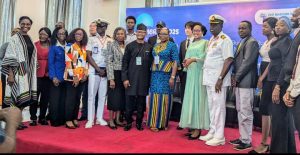

By correspondent in Lagos.

The Nigerian Content Development and Monitoring Board (NCDMB) has facilitated access to its $350 million intervention fund for at least 10 indigenous shipping firms, bolstering local participation in the maritime sector.
The Executive Secretary of NCDMB, Mr. Felix Ogbe, made this known in Lagos during a panel discussion at the 2025 Maritime Business Roundtable Breakfast Meeting organized by Zoe Maritime Resources Ltd.
Themed “Maritime Logistics and Sustainability of the Ocean Economy,” the event gathered key industry stakeholders to discuss growth strategies for Nigeria’s maritime sector.
Represented by the General Manager,Research, Statistics, and Development, Mr. Silas Ajimijaye, Ogbe emphasized that the fund, domiciled in the Bank of Industry (BOI), is a low-interest, single-digit loan facility.
Since BOI took charge of managing the fund, he noted, the default rate has remained significantly low, enabling more shipping firms to access and repay the loan swiftly.
Ogbe confirmed that over 10 Nigerian shipping firms, including Starz Marine Investment, have benefitted from the facility.
“We are working with several others, and the fund keeps growing. The more it is utilized, the more it is replenished through repayments,” he said.
According to him, the Nigerian Content Plan (NCP) ensures that indigenous shipping firms secure a stake in maritime contracts.
“Every contract must include provisions for Nigerian participation, ensuring a gradual transfer of expertise and business ownership to locals,” he stated.
Ogbe further highlighted NCDMB’s collaboration with international firms to train Nigerian seafarers, strengthen the local workforce, and drive efficiency in maritime logistics.
“Through advocacy and capacity-building programmes, we bridge knowledge gaps and integrate Nigerians into the shipping ecosystem,” he added.
In her presentation, Engr. Elsie Egwuatu, Head of Marine at the National Inland Waterways Authority (NIWA), outlined NIWA’s role in ensuring safe and seamless inland waterway operations.
She identified maritime accidents, safety concerns, navigational disruptions, and regulatory bottlenecks as key challenges, while commending the Ministry of Marine and Blue Economy for its interventions.
Similarly, Oluwadamilola Emmanuel, General Manager, Lagos Waterways Authority (LASWA), represented by Engr. Sunday Ukeme, disclosed that LASWA has established a Monitoring and Control Center in Falomo to oversee ferry routes and provide rapid responses to waterway incidents.
He also revealed an empowerment initiative for women in riverine communities, training them to convert water hyacinths into usable products.
Naval Dockyard Ltd.’s Navy Captain Olabode Teniola called for greater collaboration between LASWA and the Nigerian Maritime Administration and Safety Agency (NIMASA) to enforce environmental regulations and curb water pollution.
He stressed the need for proactive measures against oil spills, urging authorities to improve their response mechanisms.
Meanwhile, Mrs. Ruth Chukwukezirim, CEO of Global Energy and Logistics, underscored the complexity of freight forwarding, highlighting the necessity for specialized training and better industry coordination.
The CEO of Ocean Ambassador Foundation, Mrs. Violet Williams, commended the Nigerian Navy for incorporating women into shipbuilding projects.
She urged industry leaders to leverage data-driven strategies for performance evaluation and regulatory compliance.
In her remarks, Mrs. Tosan Edodo-Emore, Convener of the event and Chairperson of Zoe Maritime Resources, described maritime logistics as a crucial driver of the ocean economy.
She emphasized the need for Nigeria, as a coastal nation, to harness its marine resources for sustainable economic growth and poverty eradication.
The Zoe Maritime Business Roundtable Breakfast continues to serve as a pivotal platform for shaping policies that advance Nigeria’s maritime and logistics industries.
Edited by Dada Ahmed.


